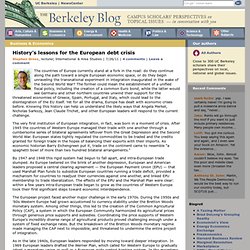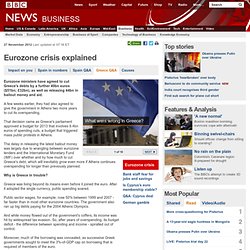

Data. Eurozone. Rating agencies? What Really Caused the Eurozone Crisis? (Part 1) I've been doing some work on gaining a better understanding of the root causes of eurozone (EZ) debt crisis.

As a point of departure, let's take a couple of dueling quotes. First, Wolfgang Schäuble, Germany’s finance minister, from his recent piece in the Financial Times: Whatever role the markets have played in catalysing the sovereign debt crisis, it is an undisputable fact that excessive state spending has led to unsustainable levels of debt and deficits that now threaten our economic welfare. Next, here's an excerpt from a statement recently made by Greece's Deputy Prime Minister and Minister of Finance, Evangelos Venizelos: We should not be the scapegoat or the easy excuse that will be used by European and international institutions in order to hide their own lack of competence to manage the crisis and give a definitive and complete answer to the attacks against euro, the world’s strongest currency. Local Causes or Systemic Causes? Evidence 1. 2. 3. So... History’s lessons for the European debt crisis. The countries of Europe currently stand at a fork in the road: do they continue along the path toward a single European economic space, or do they begin unraveling the transnational experiment in integration inaugurated in the wake of the Second World War?

The former could mean the establishment of a unified fiscal policy, including the creation of a common Euro bond, while the latter would see Germany and other northern countries unwind their support for the threatened economies of Greece, Spain, Portugal, and Italy, which could lead to the disintegration of the EU itself. Yet for all the drama, Europe has dealt with economic crises before. Knowing this history can help us understand the likely ways that Angela Merkel, Nicholas Sarkozy, Jean Claude Trichet, and other European leaders will respond to the current challenge.
The very first institution of European integration, in fact, was born in a moment of crisis. The European project faced another major challenge in the early 1970s. European public debt at a glance. Is the euro crumbling? Q&A: Greek debt crisis. 27 November 2012Last updated at 07:16 ET Continue reading the main story What went wrong in Greece?

Greece's economic reforms, which led to it abandoning the drachma as its currency in favour of the euro in 2002, made it easier for the country to borrow money. Greece went on a big, debt-funded spending spree, including paying for high-profile projects such as the 2004 Athens Olympics, which went well over its budget. The country was hit by the downturn, which meant it had to spend more on benefits and received less in taxes. There were also doubts about the accuracy of its economic statistics. Greece's economic problems meant lenders started charging higher interest rates to lend it money. There have been demonstrations against the government's austerity measures to deal with its debt, such as cuts to public sector pay and pensions, reduced benefits and increased taxes. In 2010, the EU, IMF and ECB agreed a bailout worth 110bn euros (£92bn; $145bn) for Greece.
BACK 1 of 10 NEXT Default.